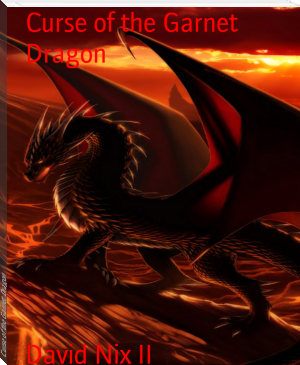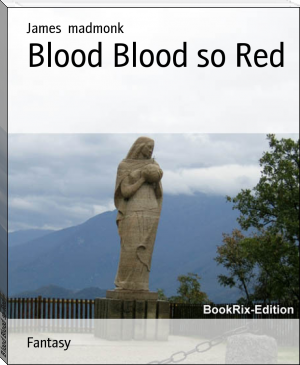Otto of the Silver Hand by Howard Pyle (best summer reads .txt) 📗

- Author: Howard Pyle
Book online «Otto of the Silver Hand by Howard Pyle (best summer reads .txt) 📗». Author Howard Pyle
Upon the other side of the landing was a window that pierced the thick stone walls of the tower; out of the window he looked, and then drew suddenly back again with a gasp, for it was through the outer wall he peered, and down, down below in the dizzy depths he saw the hard gray rocks, where the black swine, looking no larger than ants in the distance, fed upon the refuse thrown out over the walls of the castle. There lay the moving tree-tops like a billowy green sea, and the coarse thatched roofs of the peasant cottages, round which crawled the little children like tiny human specks.
Then Otto turned and crept down the stairs, frightened at the height to which he had climbed.
At the doorway he met Mother Hilda. “Bless us,” she cried, starting back and crossing herself, and then, seeing who it was, ducked him a courtesy with as pleasant a smile as her forbidding face, with its little deep-set eyes, was able to put upon itself.
Old Ursela seemed nearer to the boy than anyone else about the castle, excepting it was his father, and it was a newfound delight to Otto to sit beside her and listen to her quaint stories, so different from the monkish tales that he had heard and read at the monastery.
But one day it was a tale of a different sort that she told him, and one that opened his eyes to what he had never dreamed of before.
The mellow sunlight fell through the window upon old Ursela, as she sat in the warmth with her distaff in her hands while Otto lay close to her feet upon a bear skin, silently thinking over the strange story of a brave knight and a fiery dragon that she had just told him. Suddenly Ursela broke the silence.
“Little one,” said she, “thou art wondrously like thy own dear mother; didst ever hear how she died?”
“Nay,” said Otto, “but tell me, Ursela, how it was.”
“Tis strange,” said the old woman, “that no one should have told thee in all this time.” And then, in her own fashion she related to him the story of how his father had set forth upon that expedition in spite of all that Otto’s mother had said, beseeching him to abide at home; how he had been foully wounded, and how the poor lady had died from her fright and grief.
Otto listened with eyes that grew wider and wider, though not all with wonder; he no longer lay upon the bear skin, but sat up with his hands clasped. For a moment or two after the old woman had ended her story, he sat staring silently at her. Then he cried out, in a sharp voice, “And is this truth that you tell me, Ursela? and did my father seek to rob the towns people of their goods?”
Old Ursela laughed. “Aye,” said she, “that he did and many times. Ah! me, those day’s are all gone now.” And she fetched a deep sigh. “Then we lived in plenty and had both silks and linens and velvets besides in the store closets and were able to buy good wines and live in plenty upon the best. Now we dress in frieze and live upon what we can get and sometimes that is little enough, with nothing better than sour beer to drink. But there is one comfort in it all, and that is that our good Baron paid back the score he owed the Trutz-Drachen people not only for that, but for all that they had done from the very first.”
Thereupon she went on to tell Otto how Baron Conrad had fulfilled the pledge of revenge that he had made Abbot Otto, how he had watched day after day until one time he had caught the Trutz-Drachen folk, with Baron Frederick at their head, in a narrow defile back of the Kaiserburg; of the fierce fight that was there fought; of how the Roderburgs at last fled, leaving Baron Frederick behind them wounded; of how he had kneeled before the Baron Conrad, asking for mercy, and of how Baron Conrad had answered, “Aye, thou shalt have such mercy as thou deservest,” and had therewith raised his great two-handed sword and laid his kneeling enemy dead at one blow.
Poor little Otto had never dreamed that such cruelty and wickedness could be. He listened to the old woman’s story with gaping horror, and when the last came and she told him, with a smack of her lips, how his father had killed his enemy with his own hand, he gave a gasping cry and sprang to his feet. Just then the door at the other end of the chamber was noisily opened, and Baron Conrad himself strode into the room. Otto turned his head, and seeing who it was, gave another cry, loud and quavering, and ran to his father and caught him by the hand.
“Oh, father!” he cried, “oh, father! Is it true that thou hast killed a man with thy own hand?”
“Aye,” said the Baron, grimly, “it is true enough, and I think me I have killed many more than one. But what of that, Otto? Thou must get out of those foolish notions that the old monks have taught thee. Here in the world it is different from what it is at St. Michaelsburg; here a man must either slay or be slain.”
But poor little Otto, with his face hidden in his father’s robe, cried as though his heart would break. “Oh, father!” he said, again and again, “it cannot be—it cannot be that thou who art so kind to me should have killed a man with thine own hands.” Then: “I wish that I were back in the monastery again; I am afraid out here in the great wide world; perhaps somebody may kill me, for I am only a weak little boy and could not save my own life if they chose to take it from me.”
Baron Conrad looked down upon Otto all this while, drawing his bushy eyebrows together. Once he reached out his hand as though to stroke the boy’s hair, but drew it back again.
Turning angrily upon the old woman, “Ursela,” said he, “thou must tell the child no more such stories as these; he knowest not at all of such things as yet. Keep thy tongue busy with the old woman’s tales that he loves to hear thee tell, and leave it with me to teach him what becometh a true knight and a Vuelph.”
That night the father and son sat together beside the roaring fire in the great ball. “Tell me, Otto,” said the Baron, “dost thou hate me for having done what Ursela told thee today that I did?”
Otto looked for a while into his father’s face. “I know not,” said he at last, in his quaint, quiet voice, “but methinks that I do not hate thee for it.”
The Baron drew his bushy brows together until his eyes twinkled out of the depths beneath them, then of a sudden he broke into a great loud laugh, smiting his horny palm with a smack upon his thigh.
VII. The Red Cock Crows on Drachenhausen.
There was a new emperor in Germany who had come from a far away Swiss castle; Count Rudolph of Hapsburg, a good, honest man with a good,





Comments (0)